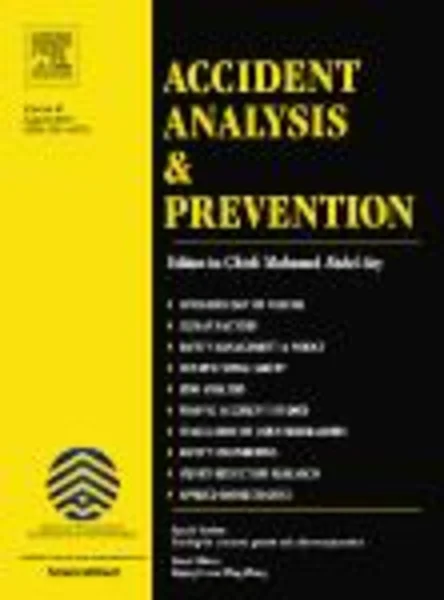-
the effects of positive emotion priming on self-reported reckless driving
جزئیات بیشتر مقاله- تاریخ ارائه: 1392/01/01
- تاریخ انتشار در تی پی بین: 1392/01/01
- تعداد بازدید: 824
- تعداد پرسش و پاسخ ها: 0
- شماره تماس دبیرخانه رویداد: -
five studies examined the effects of positive emotion priming on the willingness to drive recklessly. in all five, young drivers were exposed to one of the following primes of positive affect: a positive mood story; happy memories; an exciting film; a relaxing film; or thoughts on the meaning in life. following the prime, the participants were asked to report on their willingness to drive recklessly. the responses were compared to those of groups exposed either to neutral affect, another kind of positive affect, or negative affect priming. in two of the studies, participants were also asked to report on their driving styles (risky, anxious, angry, or careful) as a second dependent variable. positive affect, especially in the form of arousal, was found to be related to higher willingness to drive recklessly. although men tended to report higher intentions to drive recklessly, men and women did not react differently to the emotional induction. most interestingly, positive emotions of a relaxing nature, as well as thinking about the meaning in life, lowered the willingness to engage in risky driving. the discussion emphasizes the importance of looking for new ways to use positive emotions effectively in road safety interventions, and considers the practical implications of the studies.
مقالات جدیدترین رویدادها
-
استفاده از تحلیل اهمیت-عملکرد در ارائه الگوی مدیریت خلاقیت سازمانی و ارائه راهکار جهت بهبود
-
بررسی تاثیر ارزش وجوه نقد مازاد بر ساختار سرمایه شرکت های پذیرفته شده در بورس اوراق بهادار تهران
-
بررسی تأثیر سطح افشای ریسک بر قرارداد بدهی شرکت های پذیرفته شده در بورس اوراق بهادار تهران
-
بررسی تأثیر رتبه بندی اعتباری مبتنی بر مدل امتیاز بازار نوظهور بر نقد شوندگی سهام با تأکید بر خصوصی سازی شرکت ها
-
تأثیر آمیخته بازاریابی پوشاک ایرانی بر تصویر ذهنی مشتری پوشاک ایرانی (هاکوپیان)
-
بررسی آزمایشگاهی تاثیر ذرات پلی اتلین ترفتالات (pet) بر مقاومت و جذب آب در بتن
-
راه های مقاومت سازه های فولادی در برابر خرابی های پیشرونده
-
بررسی ارتباط میان رفتار شهروندی سازمانی (ocb) و عملکرد کارکنان
-
بررسی اثر انعطاف پذیری بستر بر شتاب افتادگی بلوک های صلب لاغر تحت بارگذاری رایکر
-
بررسی کاربرد فرآیندهای قلب و صوت افزایی در لهجه ی نایینی
مقالات جدیدترین ژورنال ها
-
مدیریت و بررسی افسردگی دانش آموزان دختر مقطع متوسطه دوم در دروان کرونا در شهرستان دزفول
-
مدیریت و بررسی خرد سیاسی در اندیشه ی فردوسی در ادب ایران
-
واکاوی و مدیریت توصیفی قلمدان(جاکلیدی)ضریح در موزه آستان قدس رضوی
-
بررسی تاثیر خلاقیت، دانش و انگیزه کارکنان بر پیشنهادات نوآورانه کارکنان ( مورد مطالعه: هتل های 3 و 4 ستاره استان کرمان)
-
بررسی تاثیر کیفیت سیستم های اطلاعاتی بر تصمیم گیری موفق در شرکتهای تولیدی استان اصفهان (مورد مطالعه: مدیران شرکتهای تولیدی استان اصفهان)
-
بازکاوی مفاهیم روانشناسی مدیریت و تاثیر آن در بهره وری سازمان
-
نقش بانکها و مؤسسات اعتباری در رونق اقتصاد ملی
-
بررسی حوادث هسته ای در راکتورهای نسل جدید
-
آثار کرونا بر عدالت کیفری اطفال و نوجوانان با نگاهی به حقوق ایالات متحده آمریکا
-
mesoporous sio2-al2o3: an efficient catalyst for synthesis of 4,5-dihydro-1,3,5-triphenyl-1h-pyrazole




سوال خود را در مورد این مقاله مطرح نمایید :